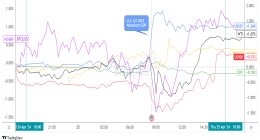
These days, I have a new, surprisingly packed schedule of cooking, washing up, video-conferencing with everyone I’ve ever met, and hiding in bed hoping that history can’t hear me breathing. The giant sticky notes are proliferating around the house, and my roommates tolerate them so long as I don’t start linking them together with red thread and pictures of my enemies. Despite being various flavors of neurotic workaholic, my roommates and I have discovered that right now, while our personal productivity matters, what matters more immediately is that we all manage to live in the same house without killing each other. The human race as a whole seems to be coming to a similar realization.
There has always been something a little obscene about the cult of the hustle, the treadmill of alienated insecurity that tells you that if you stop running for even an instant, you’ll be flung flat on your face—but the treadmill is familiar. The treadmill feels normal. And right now, when the world economy has jerked to a sudden, shuddering stop, most of us are desperate to feel normal. This column is happening because I lost one of my three jobs to the Covid-19 crisis right around the time when I realized I had no idea when I was going to see my mum again, and after a few hours of crying and tidying, I emailed my kind editor in a panic and told him to please give me deadlines, I don’t know who I am without them. Why don’t I know?
The way most of us have been conditioned to think about work in the modern economy has all the hallmarks of hypervigilance. It’s what happens to people when they are trapped in abusive circumstances they cannot escape. Psychologist Judith Herman observed that “the ultimate effect of [psychological domination] is to convince the victim that the perpetrator is omnipotent, that resistance is futile, and that her life depends upon winning his indulgence through absolute compliance.” The body responds to relentless insecurity and threat with agitated alertness, looking for ways to protect itself from harm. This is how most of my peers have experienced the modern economy. We were told that if we worked hard, we would be safe, and well, and looked after, and the less this was true, the harder we worked.
The idea that hustling can save you from calamity is an article of faith, not fact—and the Covid-19 pandemic is starting to shake the collective faith in individual striving. The doctrine of “workism” places the blame for global catastrophe squarely on the individual: If you can’t get a job because jobs aren’t there, you must be lazy, or not hustling hard enough. That’s the story that young and young-ish people tell themselves, even as we’ve spent the whole of our brief, broke working lives paying for the mistakes of the old, rich, and stupid. We internalized the collective failures of the ruling class as personal failings that could be fixed by working smarter, or harder, or both—because that, at least, meant that we might be able to fix them ourselves.
The cult of productivity doesn’t have an answer for this crisis. Self-optimizing will not save us this time, although saying so feels surprisingly blasphemous. This isn’t happening because you didn’t work hard enough, and it won’t be fixed by optimizing your morning routines and adopting a can-do attitude. After the quarantine, after we count the lives lost or ruined, recession is coming. A big one. For millennials, it’s the second devastating economic calamity in our short working lives, and we’re still carrying the trauma of the first. This time, though, we know it’s not our fault. This time it’s abundantly clear that we didn’t deserve it. And this is exactly the sort of crisis that gives people ideas about overturning the social order.








